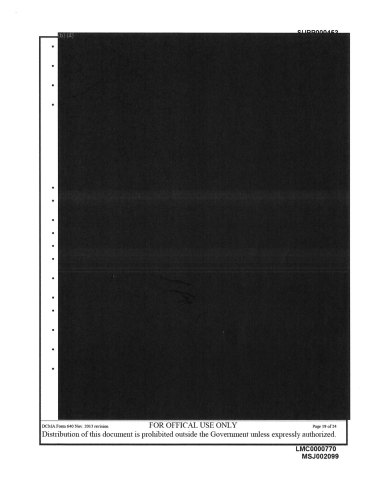American Small Business League beats DoD and Lockheed in Federal Court and recovers $500,000; Pentagon Fails at Attempt to Withhold Key Pentagon and Lockheed Documents
The United States government has paid $500,000 in compensation to the American Small Business League (ASBL), which prevailed in part on a multi-year court battle to force the Department of Defense to disclose documents showing whether big defense contractors like Lockheed Martin complied with laws requiring them to subcontract to small business. The court rejected the government’s claim that it could withhold documents in which the government assessed the contractors’ compliance, and ordered the U.S. Department of Defense and the Department of Justice to produce a trove of documents requested by ASBL pursuant to the Freedom of Information Act.
This press release features multimedia. View the full release here: https://www.businesswire.com/news/home/20200318005183/en/

One of the pages released to the public, a fully Redacted page in the Lockheed Martin DoD’s Comprehensive Subcontracting Plan Test Program (“Test Program”) for FY 2014. (Photo: Business Wire)
The Act is designed to allow American citizens to see what government is up to by providing access to official information shielded unnecessarily from public view. Courts have held that the Act is vital to the functioning of a democratic society and that access to information is needed to check against corruption and to “hold the governors accountable to the governed.” The Act allows a party who prevails in litigation to recover its attorneys’ fees.
A congressional report published in January 2016 found that “FOIA is broken,” and highlighted a culture within the federal government of “unlawful presumption in favor of secrecy when responding to Freedom of Information Act Requests.” The report pointed to government abuse of FOIA exemptions to unlawfully withhold information, excessive fees, and delays in response time from agencies as the key factors in eroding public trust and use of the law.
In the face of blatant dismissals of requests for information on the part of federal agencies, often the only channel for remedy is a lawsuit. “Requesters shouldn’t need a lawsuit to get responsive documents,” wrote the authors of the congressional report. In FY 2017, the DOJ reported it spent $40.7 million defending FOIA related lawsuits. Since President Trump took office, FOIA suits have more than doubled. The government’s costs, however, fail to capture the cost to those bringing suits against federal agencies to enforce their right to information under FOIA. Journalist Cezary Podkul wrote about wanting to find information that would reveal failures by the City of New York to oversee important housing tax breaks, “but short of suing the agency – an expensive proposition that could take years if the agency actively resists and appeals when it loses – I can’t find out.” Podkul’s statement is illustrative of the continued frustration with FOIA, and the reluctance to use the courts to force FOIA compliance.
An exemption in federal law allows the government to withhold a private company’s information if that company actually and customarily treats the information as private in the ordinary course of business, and has been assured of privacy by the government. Here, however, the government fought to block disclosure of its own reports and assessments of the subcontracting performance of major defense contractors, such as Lockheed Martin and its subsidiary, Sikorsky Aircraft Corporation, on grounds that those reports were “private.” Sikorsky is a major supplier of aircraft to the Department of Defense.
The case was assigned to Judge William Alsup of the Federal District Court in San Francisco, who had previously described ASBL being in the role of “underdog…against the big company and against the big government,” “like a David and Goliath.” Here, Judge Alsup rejected the privacy claim, writing that “only information originating from the companies themselves” can be considered confidential information and that government assessments and evaluations do not qualify. Judge Alsup had to remind the DoD, “You are not a wholly-owned subsidiary of Lockheed. You are a wholly-owned subsidiary of the United States people.” Judge Alsup ordered the government to “release updated redacted versions” of all documents at issue in the lawsuit, including the government’s evaluation of whether Lockheed and Sikorsky complied with the law.
As a result of ASBL’s lawsuit, the government finally released more than 2,000 pages of documents in January 2020. They reveal that the government rated Sikorsky “Marginal-Deficient” in meeting subcontracting plan requirements:
“Marginal – Deficient in meeting key subcontracting plan elements or the contractor has failed to satisfy one or more requirements of a corrective action plan from the prior review. Fail to comply with the submission requirements in eSRS on the majority of their contracts with subcontracting plans and no evidence of flow-down to applicable subcontractors. There is evidence of corporate and/or senior management commitment to bring their subcontracting program to an acceptable level and has demonstrated a commitment to apply the necessary resources to do so. A corrective action plan is required, and the Administrative Contracting Officer(s) (ACO) and SBA CMR(s) must be notified.”
The documents also reveal that Sikorsky at times failed to meet its legal requirements or was “unable” to meet others. The government can impose serious ramifications on contractors who do not meet goals, including liquidated damages for non-compliance, a denial of future contracts or probation, yet there are no known instances of these ramifications being used. One of the documents released in this case showed that the Defense Contract Management Agency found a “huge gap” between Sikorsky’s goals and performance, and another found that “DCMA does not find this [Sikorsky’s plans] acceptable.” The DCMA ordered Sikorsky to take corrective action.
Large prime contractors who receive federal contracts in excess of $700,000 are required to establish plans and goals for subcontracting with small businesses when subcontract opportunities exist. The newly-disclosed documents reveal that Lockheed Martin received $25 billion in orders from the Department of Defense during a one-year period. During that period, Lockheed failed to meet three out of six of its negotiated goals. It did not meet its subcontracting goals for small business, small disadvantaged business, or woman-owned small business. Internal DCMA documents reveal that Lockheed submitted an inaccurate Subcontract Report erroneously identifying three different suppliers as small disadvantaged businesses when they were not. The DCMA found that Lockheed’s Subcontract Report was considered “not accurate,” noting “various errors” with the supplier’s size classifications. It states that Lockheed suppliers did not validate their size and Lockheed relied on the suppliers’ self-reports as to their size. From FY 2009 to FY 2014 Lockheed’s percent of subcontracted dollars going to small businesses decreased from 25.3% to 17.2%.
“Americans are entitled to know how their tax dollars are spent, and they want to know,” according to ASBL President, Lloyd Chapman. But the disclosed documents were heavily redacted, including sections stating the total dollar value of Sikorsky’s contracts with the Department of Defense and action Sikorsky needed to take to come into compliance.
The DCMA admits that it had no examples of small business participation in Sikorsky contracts to review for a certain one-year period, but nonetheless concluded that Sikorsky was adhering to a plan that required it to facilitate small business participation in contracts.
Since 2005, ASBL has filed 38 FOIA lawsuits seeking disclosure of documents explaining whether the government has complied with legal requirements that 23% of all government contract dollars go to small business, as required by the Small Business Act. Bob Coleman, editor of The Coleman Report and an SBA lending expert, says, "The biggest losers of the stimulus program have been the traditional mom-and-pop businesses, and that's been borne out by all the 'For Lease' signs along the main streets of America." Politicians from both sides of the aisle indicate that small business is integral to our economy. Senator Elizabeth Warren believes “small businesses are the heart and soul of our economy.” In an opinion article, Senator Marco Rubio wrote, “If there is one thing I hear from small business owners in Florida, it’s that they feel powerless to confront the federal government’s regulatory regime. By contrast, large multinational corporations almost always have a seat at the table, with armies of compliance officers to get around the rulebook. In other words, small businesses are often most affected by the federal regulations but least represented in how they come about.”
View source version on businesswire.com: https://www.businesswire.com/news/home/20200318005183/en/



